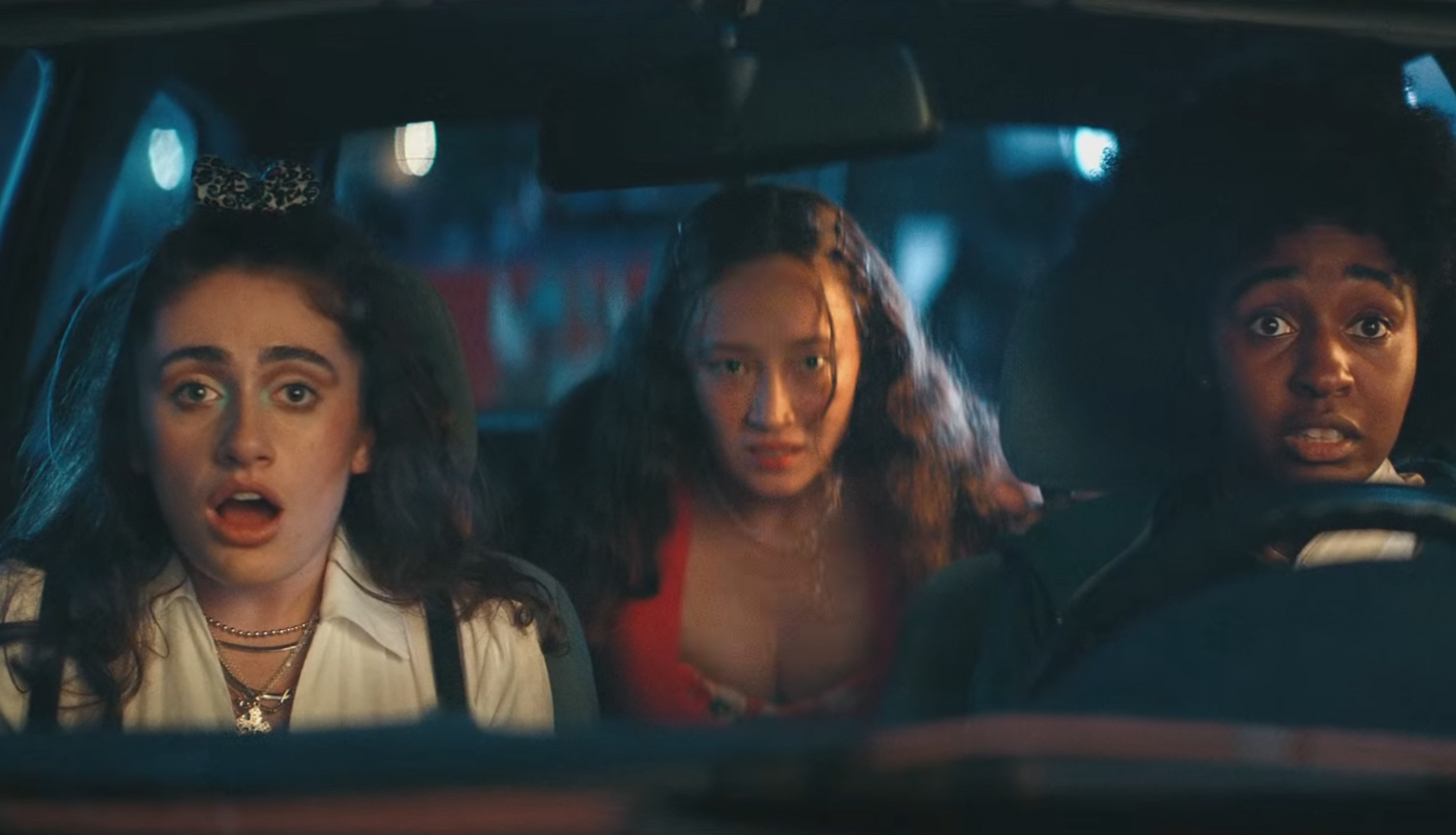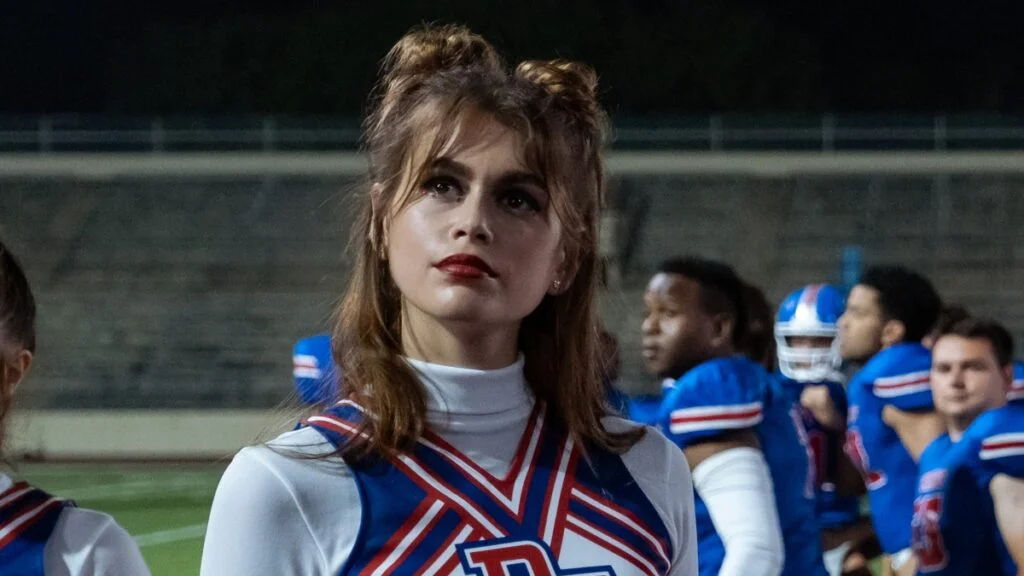I have seen Bottoms twice now. Once on Thursday, then once again with my wife on Saturday. I can count the times I have seen a movie twice before writing a review on one hand.
Emma Seligman’s ode to teen comedies and lesbians behaving badly is a rowdy, sharp-witted satire that isn’t afraid to be strange. A movie about two gay high schoolers, PJ (Rachel Sennott) and Josie (Ayo Edebiri), would be problematic if Seligman and their cowriter Sennott had placed the film in anything resembling reality. Instead, the duo cleverly crafted a world similar to what we see in various teen flicks, where adults are as sparse as the common sense that says whatever the plot is a bad idea.

Seligman and Sennott keep the jokes flying and the story moving forward without pausing to see if you are on board. One gag involves a student locked up in a cage like a feral animal; the very notion of it goes unremarked until later in the movie, when the boy is released. Despite its absurdity, or perhaps because of it, Bottoms can get away with some very dark jokes.
The MVP of Bottoms is Edebiri, whose awkward horniness is so endearing that you are rooting for her to succeed despite the plan’s doomed fate. Josie’s love for Isabel (Havana Rose Liu), the popular cheerleader, is far from chaste, but it’s also not as shallow as PJ’s crush on Brittany (Kaia Gerber).
Edebiri’s way with dialogue is a delight to behold, as she has a way of expressing so much with pronunciation. Such as the scene in which she and PJ are at the inaugural meeting of their brand new “fight club.” Josie is asked to talk about her time in juvie-to which she’s never been. Her delivery of the “Sure…okay” line is sublime as it shows a hormone-driven attitude that most teens must navigate. It also perfectly encapsulates showing that she knows this is wrong, but if the prize is Isabel, it might be worth it.
Everyone in Bottoms stands out, from Sennott’s devious and hormonal PJ to the naive and always two steps behind the conversation Hazel (Ruby Cruz). Seligman and Sennott’s script allows everyone to sell a joke and create a character just shy of being a caricature.

In a lot of ways, Bottoms reminds me of the lesser Not Another Teen Movie. The difference, as Mamet says, is all the difference. Unlike that movie, Bottoms embraces the genre of the teenage rom-com and puts its own anarchical gay spin on it. Plus, among the satirization of the tropes, the rivalry between two schools being blown up into an all-out blood lust between the two towns, there lies a big old queer heart, replete with two girls kissing and Maria Raushe’s camera spinning around them as the score by Charlie XCX and Leo Birenberg pumps over the cheerworthy moment.
Bottoms feels like an exhilirant defiance as gay rights are under attack by states nationwide. Its gayness isn’t hinted at but proudly stated in ways big and small that refuse to be ignored. If that wasn’t enough, it is the rare mainstream movie to be directed, written, shot, and edited by women. However, how mainstream Bottoms is is up for debate, considering its very limited release. But both Sennott and Edebiri are having banner years right now, so the case can be made that it rides the line of independence with a chance to go big.
For a movie like Bottoms to exist now feels like a minor miracle. It’s so unabashedly gay, and its heroes’ desires are as small and daunting as dating the popular girl. That the popular girls are revealed not to be mean or bitchy is another kudos from Seligman and Sennott’s script. Gerber’s line, “You don’t deserve dreams. When you sleep, there should be only darkness,” is one of my favorites.
Bottom is a movie with small moments that speak to a lived truth. Towards the beginning, Sennott and Edebiri have a moment in which they begin talking in unison, which is reminiscent of the hand scene from Jordan Peele’s Nope. It’s a moment that speaks volumes about the relationship between the two while also being one of the great joys of the movie.
Seligman and Rusche’s camera lens Bottoms with a sense of earnest and urgent emotion. Despite the absurdity, there were moments so grounded in reality that I was cringing. Both because I could relate, even as a straight person, and because Seligman and Rusche were unflinching in being in the moment. Seligman has said they watched Bring It On a lot while making the film, which shows how she and Rusche find ways to stage the sprawling cast within the frame.
Rusche’s frames aren’t flat like many comedies, including teen ones. Instead, the camera is a subjective viewer, making for moments where we want to look away because of the embarrassment we feel along with the character. Hannah Park’s editing keeps Bottoms from ever dragging while holding the jokes’ timing at a breakneck pace.
The jokes are so tightly packed into Bottoms that you will likely miss some as you laugh at others. Marshawn Lynch, as the semi-voice of reason and sponsor for the fight club Mr. G, has a banger about Holocaust denial. That Bottoms can make jokes about that and sexual assault and somehow end up being less problematic than, say, Booksmart goes to show that worries about wokeism destroying edgy comedy to be the shallow lies everyone with a brain knew them to be.

Bottoms has the guts to be both weird and horny on main in a way so few movies that come to theaters fail to be. Seligman shows a deft hand at balancing tones while having a terrific ratio of bullseye as they and Sennott buckshot comedy-style speed through the story. Especially when you consider how the violence escalates to a bloodthirsty crescendo. Seligman never lets the violence overwhelm the narrative, instead showing how the girls slowly lose their fear and inhibitions and grow closer because of it.
I’ve seen Bottoms twice and can’t wait to see it a third time.
Images courtesy of Metro-Goldwyn Mayer
Have strong thoughts about this piece you need to share? Or maybe there’s something else on your mind you’re wanting to talk about with fellow Fandomentals? Head on over to our Community server to join in the conversation!

